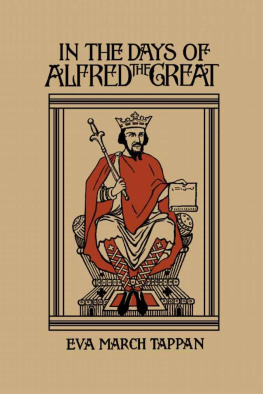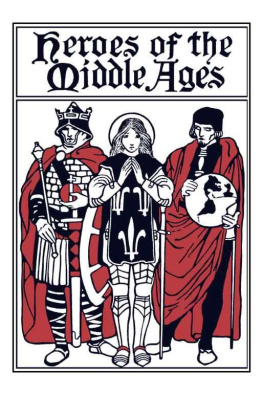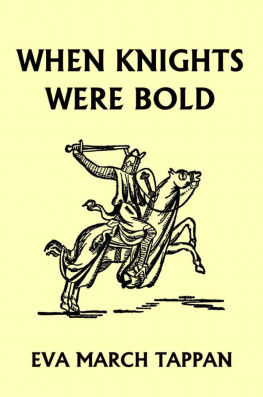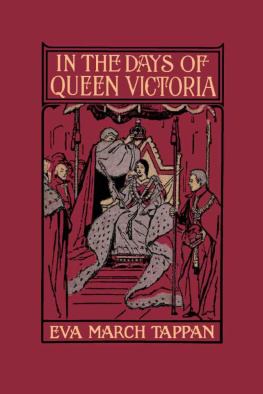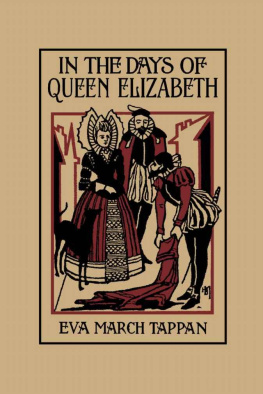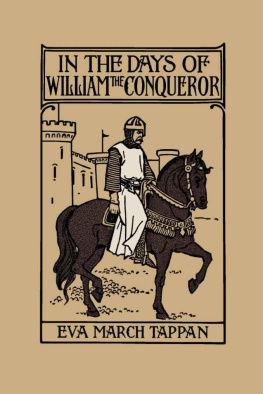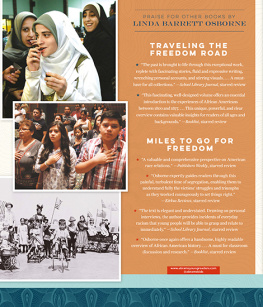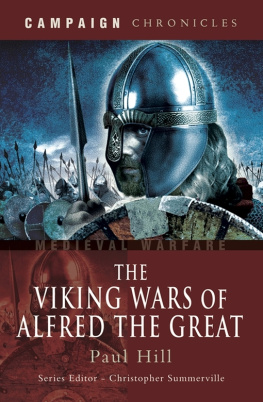In the Days of Alfred the Great
by
Eva March Tappan
Yesterday's Classics
Chapel Hill, North Carolina
Cover and Arrangement 2010 Yesterday's Classics, LLC
All rights reserved. No part of this book may be reproduced or retransmitted in any form or by any means without the written permission of the publisher.
This edition, first published in 2010 by Yesterday's Classics, an imprint of Yesterday's Classics, LLC, is an unabridged republication of the work originally published by Lee and Shepard in 1900. This title is available in a print edition (ISBN 978-1-59915-035-2).
Yesterday's Classics, LLC
PO Box 3418
Chapel Hill, NC 27515
Yesterday's Classics
Yesterday's Classics republishes classic books for children from the golden age of children's literature, the era from 1880 to 1920. Many of our titles are offered in high-quality paperback editions, with text cast in modern easy-to-read type for today's readers. The illustrations from the original volumes are included except in those few cases where the quality of the original images is too low to make their reproduction feasible. Unless specified otherwise, color illustrations in the original volumes are rendered in black and white in our print editions.
Preface
Sharing in the special interest in Alfred the Great that is aroused by the near approach of the one thousandth anniversary of the last year of his life, I have found it a real pleasure to write this story of a "blameless king." However faulty it may be, it is, at least, the result of a thoughtful study of his character, and an earnest effort to be as accurate as the scantiness of material and the thousand years' interval would permit.
Little of the legendary, less of the miraculous, has obscured the fame of the real Alfred. His deeds are his own,great in themselves, greater in that they are the manifestation of the thought of a great mind. Even in "that fierce light which beats upon a throne," it is hard to find a flaw in the character of this man who believed in God, this king who never failed to do his best.
E VA M ARCH T APPAN
WORCESTER, April, 1900
Contents
CHAPTER I
Alfred's Early Home
T HE palace in which Alfred the Great was born was hardly what we should call a palace in these days. It was a long, low, wooden house, or rather a group of houses; for whenever more room was needed, a new building was put up, and joined to the old ones wherever it seemed most convenient, so that the palace looked much like a company of one-story houses that had drifted together in a flood. There had to be room for a large family, for the king's counsellors and many of the church dignitaries lived with him. All around the house were many smaller houses for the fighting and the working men. Those were the days when at any moment a messenger might come flying on a panting horse and say:
"O King Ethelwulf, the Danes are upon us! Their ships are in the offing, and they are driving toward Thanet."
Then the king would send horsemen in hot haste to all his underchiefs, and he himself, at the head of the soldiers of his household, would march toward the coast, sometimes to fight and sometimes, if fighting failed, to buy them off by a ransom of money and jewels and vessels of gold and of silver.
The priests, with the women and children, would hasten into the church and throw themselves down before the altar and pray:
"From the fury of the Northmen, good Lord, deliver us."
They had good reason for their alarm; for perhaps even before the king and his men could reach the eastern shore, another fleet would come to land on the southern coast, and the fierce Danes would sweep like a whirlwind through the land, burning the homes of the people, carrying away the women, and tossing the little children back and forth on the points of their spears.
There were many workingmen about the king's palace, for almost everything that was needed had to be made on the premises. Not only must the grain be raised, wheat or barley or oats or corn, but it must be ground, sometimes by many small hand-mills, and sometimes by one large mill that belonged to the king. For drink, there was a kind of mead, or ale, and that must be brewed in the king's brewery. When it came to the question of clothes, there was still more work to do; for leather must be tanned for the shoes as well as for the harnesses, and flax and wool must be spun and woven. Then, too, there were blacksmiths, who not only made the simple implements needed to carry on the farm, but who must be skilful enough to make and repair the metal network of the coats of mail, and to keep the soldiers well supplied with spears and swords and battle-axes and arrowheads.
A king who was willing to "rough it" a little could live on his royal domain very comfortably without sending away for many luxuries. If his land did not border on the seashore, he would have to send for salt that was made by evaporating sea-water; and whenever he needed a mill-stone, he would send to France, for the best ones were found in quarries near Paris. For iron, King Ethelwulf sent to Sussex, not a very long journey, to be sure, but by no means an easy one, for some of the roads were of the roughest kind. If he had lived on the coast, it would have been almost as easy to send to Spain for iron, and sometimes men did make the long voyage rather than go a much shorter distance by land and bring home the heavy load. When the millstones were landed from France, the laborers had to take their cattle, and make the slow, tiresome journey to the shore to bring them home.
All these things were very interesting for the little Prince Alfred to see, though he was not quite five years old at the time when this story begins. He was the youngest child of King Ethelwulf and Queen Osburga, and a favorite with everybody on the great estate. The blacksmith had made him a tiny coat of mail and a spear, and he and the other children would play "Fight the Danes," and the soldiers would look on and say, "There's a prince for you," and often one of them would take him up before him on his horse for a mad gallop through the forest. The half-wild swine would scatter before them, and sometimes the soldier, holding the little boy firmly with one hand, would charge upon them, and leaning far over the saddle, would run his spear through one; and back they would ride to the palace, dragging the pig behind them, and the little prince, his long, yellow hair streaming in the wind, would shout, "A Dane, father! We have killed a Dane!"
Nobody troubled the little boy about learning to read. Priests must read, of course, both English and Latin, for the service of the church was in Latin, and they must know how to pronounce the words, though very few of them were quite sure what the words meant. Kings seldom learned anything of books, but King Ethelwulf could read, for when he was a young man he had wished to become a priest and had studied a little with this plan in mind. His father had opposed the scheme; for after the older brother's death Ethelwulf was his only son, and there was no one else to whom he could leave the kingdom. He was greatly troubled, for he was afraid that a king who could read would not be a good warrior, but he finally decided to test him by giving him a small kingdom to practise on; so he put Kent into his hands, and for ten years Ethelwulf ruled under his father's eye. He was so attentive to his duties as a king, that his father concluded that learning how to read had not hurt him, and so at his death he left him the whole kingdom.
Even if no one made the little boy learn to read, the days were never long enough for him. The great domain was a busy place. Everybody was making something, and everybody was glad to have the little prince look on and ask questions. There were hives of bees, and there were hunting dogs and hawks. People were coming and going from morning till night. The king rented much of his land to different families. He was bound to care for them, and they were bound to fight under him and to work for him, to make hedges and ditches, to plough, to shear the sheep, and to help make roads. Besides this, they were to pay him rent, and this rent seldom came in money, but rather in produce of the land. There was a steward whose business it was to receive the rent, and a boy would be interested to keep by his side all day long and watch what the people brought. There might be cheese or bacon or honey or home-brewed ale; and often there was quite a lively time when a man appeared with hens or ducks or geese, cackling or quacking or hissing, as the case might be, and all making as much noise as their throats would permit. Sometimes this rent was paid only as a token that the land belonged to the king, and had no real value. One man was bound to present three fishes fresh from the river four times a year, and another had only to bring a sheaf of wheat on a certain day of each year.

